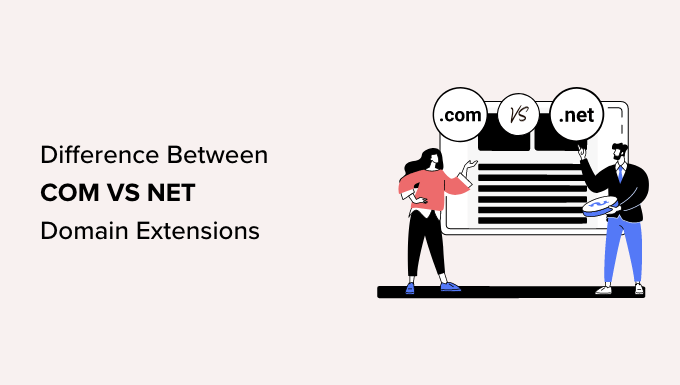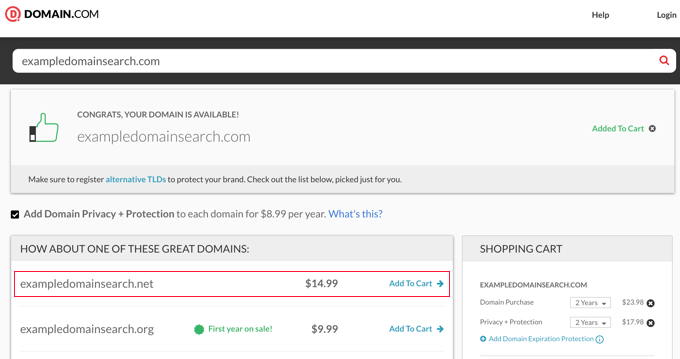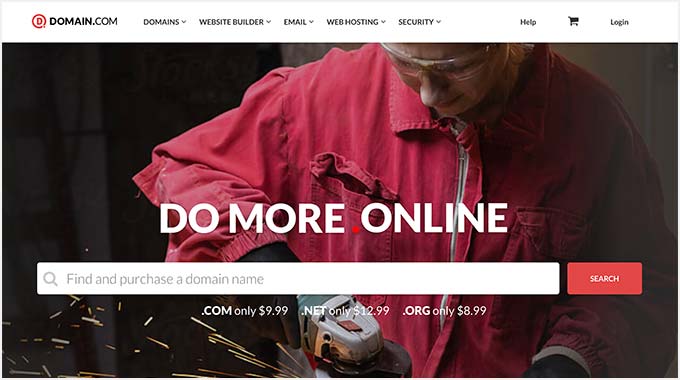If you’ve been wondering about the real difference between a .com and a .net domain, we hear you! Many of our readers have been asking us the same thing, ‘Which is better for my website?’
We get it. Choosing the right domain extension can feel like a big deal. And it is! It’s all about creating a memorable brand and making sure your visitors can easily find you. The right extension can make a difference in how people remember your website’s address.
Here at WPBeginner, we chose .com, and we believe that’s the best choice for most websites. But maybe you are still debating whether you want a .com or .net website address.
In this guide, we’ll explain the differences between these two popular extensions. Then we’ll help you solve which one makes the most sense for your site so you can make an informed decision.

What Are .Com and .Net Domain Name Extensions?
A domain name is your website’s address on the internet. Ours is wpbeginner.com.
You can learn more about domain names in our beginner’s guide on What is a domain name and how do domains work?
Domain names always have an extension. This is called a TLD, which stands for Top Level Domain. For instance:
example.com
example.net
example.org
You can choose from a wide range of domain extensions when making your website.
Most domain extensions don’t have any restrictions on usage and lots of new domain extensions like .photography, .blog, and .tv have been created in recent years.
Originally, the domain extensions were created for different types of website, such as .com for commercial sites and .net for network-related sites.
You need to choose a domain name extension that fits your business while helping you build a recognizable brand in your industry.
Let’s take a look at the difference between the most popular .com vs .net domain extensions to see which is better for your business.
What Is the Difference Between .Com vs .Net Domain Names?

Com and Net are two of the most popular domain name extensions. If your preferred .com domain name extension is not available, then you might be tempted to use .net instead.
However, .net isn’t a good option for your business in most cases.
The ‘com’ in the .com domain name indicates a ‘commercial’ site. This can cover business websites that want to make money online, personal websites and blogs, portfolios, and more.
On the other hand, the ‘net’ in the .net domain name extension stands for ‘network’. It was designed for internet, networking, and email service providers.
If you’re wondering about .org, that stands for ‘organization’ and was originally intended for use by nonprofit organizations.
When Should You Choose a .Com Domain Name?

The .com domain extension has been synonymous with the internet since the ‘dot-com bubble’ in the late 1990s. Over 40% of all registered domain names are .com domains.
It’s much easier for people to remember a .com domain name than any other domain extension. It’s familiar and reassuring, plus it makes your site look professional.
Also, most mobile keyboards have a dedicated .com button. You often have to use different gestures to find a .net button, if it’s there at all.
There’s just one problem. You’ve probably noticed that .com domain names are so popular that it feels like all the good ones are already taken!
However, there are still plenty of clever ways to get the perfect .com domain name. Here are some things to try:
- Check that your domain name represents your business and what you do. For example, stargardeningservices.com is better for SEO than starservices.com.
- If your preferred domain name is taken, then you can add a word before or after it to make it unique. Your location could work well here, such as stargardeninghouston.com or thestargardening.com.
- Make sure your domain name can be easily pronounced and remembered. Don’t use hyphens or numbers in your domain name.
- Take advantage of online domain name generators like Nameboy. These free tools will help you come up with clever domain name ideas that are unique and still available. You can also use WPBeginner’s AI-powered free business name generator.
Need more help? We’ve got lots of practical tips and real-life examples in our article on how to choose the best domain name for your website.
When You Should Use the .Net Domain Extension?
The .net extension still makes sense in some cases. You could use it if you offer internet, networking, database hosting, email hosting, or similar services.
You might even want to use a .net domain name if it truly suits your brand.
For example, Behance.net is a popular online design community that uses a .net domain extension for their website. It suits them because they wanted to be a network of artists, designers, and companies looking for talent.
Under 4% of all domain names registered are using the .net domain extension.
Why You Might Be Tempted to Use the .Net Extension
Have you ever tried to register a .com domain and seen something like this?

Domain name registrars often present .net as the top alternative to .com. This might make you think it’s more commonly used than it actually is.
Even the most well-known internet and network service companies use a .com domain name for their business.
Of course, 4% is still a lot of domain names. Over 13 million, in fact. You might wonder who’s using all those .net domain names.
In many cases, the .net domains aren’t really being used.
Many businesses register a .net extension so no one else can take it. They may not use the .net domain at all, or they may redirect it to their .com. site.
Also, some brands use a .net because they couldn’t get the .com they wanted. Most later transferred to a .com domain extension, often keeping the .net domain name registered for technical and legal reasons.
Is .Com vs .Net Better for SEO?

A lot of our users ask us which domain extension will help them rank higher, .com vs .net.
In our experience, it doesn’t make any difference which you choose from an SEO perspective. Search engines will treat both domain extensions the same.
Just focus on SEO best practices and create useful targeted content to rank higher. The important part is your domain name itself, not the extension.
For example, stargardeningservices.com will rank better than starservices.net because it contains a keyword (gardening services) that people are likely to search for.
How to Buy a Domain Name
There are two ways to get a domain name. You can choose the one that best suits you.
1. Get a FREE Domain Name with Bluehost
To make a website, you need website hosting as well as a domain name.
This may seem a bit confusing when you’re new to creating websites. Make sure you’re clear on the difference between a domain name and website hosting.
Usually, you will pay around $14.99/year for a domain name and $7.99/month for hosting. If you are just starting out, then you may feel that’s quite expensive.
Luckily, the folks at Bluehost are offering WPBeginner users a free domain name and a 65% discount on hosting.
2. Register a Domain Name
If you don’t want to make a website straight away, you can still register a domain name and make a website later.
We recommend using Domain.com for this. They offer features like private registration, easy transfers, easy DNS management, and more. Their search tool shows you premium domains as well as regular ones, too.

To get an exclusive 25% discount on your domain, make sure you go through our link to Domain.com. This will automatically apply our Domain.com coupon code.
If you’re looking for Domain.com alternatives, then see our list of the best domain registrars.
If this is your first time registering a domain name, then you may want to use our step-by-step guide on how to register a domain name.
We hope this article helped you learn the difference between .com and .net domain name extensions. You may also want to see our guide on the difference between a domain name and web hosting or our expert picks of the best domain name generators to help you pick a domain fast.
If you liked this article, then please subscribe to our YouTube Channel for WordPress video tutorials. You can also find us on Twitter and Facebook.





David Lim
Domains ending in .ai have become quite popular since chatgpt appeared. (no surprise why).
Well, if someone has an affinity for such topics, they can easily buy it at a great price. For me, however, the .com ending is still the winner.
Dayo Olobayo
There’s a common saying among domain investors that .com is king. The extension has lived long enough that people now automatically feel every website must end in dotcom which quite frankly seems fair. However, some domain names are more valuable in other extensions. I would rather pick a one-word related domain name in .net than a three-word domain in the .com extension.
WPBeginner Support
Thank you for sharing your opinion
Admin
Mrteesurez
Of course, .com domains are more common and popular, I rarely see .net domains. It’s even costlier than .com domain so many people stick to .com.
Thanks for the insight of putting keywords in a domain name for fast SEO ranking.
Chris
This is all very good but what about “.meta” and “.x” extensions? They’ve been pushing these now for years with the promise that you’ll be sitting on a goldmine if you are lucky enough to buy one of few remaining website url’s with those extensions yet I’m not seeing that the internet is one bit closer to this actually happening. Am I missing something? Thanks.
WPBeginner Support
We currently recommend the domain extensions in our article over those. New domains are nice in concept but until other domains become common it is best to stick with the extensions that people know and expect from a site
Admin
Karan Rawal
Additionally, Domains without .com are confused with other brands. A domain name that doesn’t end in .com leaves your brand open to being confused with another brand and allows customers to consider you less valuable before they know anything about your product or service.
Whenever you want to buy a domain for your business, remember how well your business will dominate the market in the future. This trend helps influence your decision to buy a name for around $1 to $5 million. Now as your business space grows, those benefits are directly tied to the value of the domain and your company. This is exactly the type of growth and position you want to aim for. After 10 years you can assume that if you buy a .net domain instead of .com then today .com will be very expensive.
WPBeginner Support
Thank you for sharing this thought process
Admin
Jane
I want to learn how to design a website
WPBeginner Support
For a starting point for beginners, you would want to take a look at page builders. We have a few we would recommend in our article below:
https://www.wpbeginner.com/beginners-guide/best-drag-and-drop-page-builders-for-wordpress/
Admin
ABH
I think that the end user dont really looks what extension the web site has, if the web site has quality, the extension can be whatever it wants …
David
I wonder what you think of an extension like .site?
My .com etc was taken and currently using it.
Your thoughts would be great.
WPBeginner Support
Hi David,
We recommend .com domain name extension for most websites.
Admin
Jay
Great article! I currently have a .net domain but I opted to use the new .marketing extension since I own a marketing/media agency. Wondering what yours and your readers thoughts are on all of these new extensions?
Celeste Epstein
Typo:
Differnce Between .Com vs .Net Domain Names
What about .org? and others?
Thanks for a great site!
WPBeginner Support
Hi Celeste,
.org domain names should only be used for non-profit organizations who have no intentions to ever use that domain for commercial purposes. They are not suitable for personal or community blogs or commercial websites for any kind of business.
Admin
Rick
What do you think about the .blog, obviously used for a site that is blog?
WPBeginner Support
Hi Rick,
We still recommend using only .com even for blogs.
Admin
Andy S
it shouldn’t be limited to just com/net. With the statistics from Verisign that shows there’s about total of almost 130mi+/- of domains registered with com/net, chances of getting your preferred com/net domains are hard – it’s not impossible but just you may need to tweak around your final name if you can’t get it.
Just for example for some small blog site, we could have came across some sites are running theirnameblog.com. Would it be better if it’s just name.blog – it looks shorter and also tell the people is a blog, why do we need to append the .com at the end? And would using the new tld extensions give you a standout?
I have seen a lot of SaaS company are using the .io as their domain name as another example. And if you are doing some AI offering, .ai will be another good option to take a look instead of .com.
So yes, my view are same with you @Rick, other new tld extension should be one of preferred options for your personal website and not just .com/.net